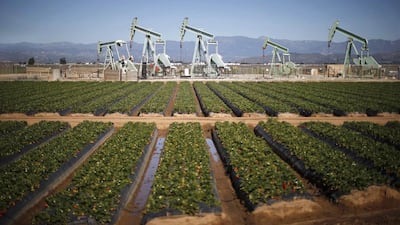Oil prices rose on Friday after comments by US Federal Reserve Chair Jerome Powell indicated the central bank was preparing to cut interest rates amid growing demand concerns and easing geopolitical tensions.
Brent, the benchmark for two thirds of the world's oil, settled up by 2.33 per cent at $79.02 a barrel. West Texas Intermediate, the gauge that tracks US crude, finished up 2.49 per cent at $74.83.
“Oil bears are having it their way with Brent crude tumbling to January lows on growing recession risks, China’s economic malaise and encouraging signs that we may be nearing a ceasefire between Israel and Hamas,” said Ehsan Khoman, head of commodities, ESG and emerging markets at MUFG.
US Federal Reserve Chairman Jerome Powell delivered a speech on Friday at the Jackson Hole symposium in Wyoming, as investors looked for clearer guidance on whether he thinks inflation has eased enough to allow for an interest rate cut next month.
Mr Powell endorsed easing the Fed's policies, saying further cooling in the job market would be unwelcome. He also expressed confidence inflation was within reach of the US central bank's 2 per cent target.
"The upside risks to inflation have diminished. And the downside risks to employment have increased," he said.
"The time has come for policy to adjust. The direction of travel is clear, and the timing and pace of rate cuts will depend on incoming data, the evolving outlook, and the balance of risks."
The Fed has held its target range at 5.25 per cent to 5.50 per cent since last July after aggressively raising rates in response to the US surge in inflation.

Lower interest rates stimulate economic growth, boosting crude demand.
The speech also comes amid concerns of growing unemployment in the world’s largest economy.
A disappointing jobs report this month heightened fears of a recession in the US and triggered a global sell-off in stock and commodity markets.
“Recession fears in the US following a weak job market report initiated the sell-off and ongoing ceasefire hopes in Gaza have lowered crude's risk premium,” said Giovanni Staunovo, strategist at UBS.
“Weak Chinese crude imports and refinery activity in July sparked fears of poor Chinese oil demand.”
Meanwhile, in the Middle East earlier this week, talks on a ceasefire in the Israel-Gaza war had seemingly been gaining momentum.
US Secretary of State Antony Blinken said Israel had accepted a “bridging proposal” to address disagreements hindering a ceasefire deal in Gaza.
On Thursday, however, a senior Hamas official said the group will not agree to any “concessions” in exchange for a ceasefire deal and urged its regional allies to “widen” the confrontation with Israel.
Israeli Prime Minister Benjamin Netanyahu “will not get anything from the resistance, and Hamas will not agree to any additional concessions”, Mahmoud Taha, the group's head of media relations in Beirut, told The National.
“Our base case remains that the $80 a barrel floor under Brent oil prices will withstand macro fears and that oil prices will find support in coming weeks,” MUFG's Mr Khoman said.
He added that crude prices will be supported by limited recession risks, resilient demand in developed markets and the potential for increased speculative investments.
Brent has lost about 15 per cent of its value after breaching the $90 a barrel mark in April.

